The Iliad is an ancient Greek epic poem traditionally attributed to the poet Homer. The poem primarily focuses on the Trojan War and the Greek hero Achilles. Let’s break this poem down.
Short Summary
“The Iliad” unfolds during the final weeks of the ten-year-long Trojan War. At its heart is the Greek hero Achilles, who withdraws from battle after a dispute with his commander, Agamemnon. The Greeks suffer greatly in his absence. However, when Hector, the Trojan prince, kills Achilles’ close friend Patroclus, Achilles returns to the fight, driven by grief and rage. He confronts and kills Hector outside the walls of Troy, dishonoring the body in his grief. The epic concludes with Hector’s funeral, after his body is ransomed back by his grieving father, King Priam of Troy, highlighting the devastating personal costs of war.
Basic Info
Title of the Work: The Iliad
Author: Homer
Date of Composition: Estimated around the 8th century BC
Original Language: Ancient Greek
Genre: Epic
Form and Structure: Dactylic hexameter
Setting: The city of Troy during the Trojan War
Themes: Honor, wrath, fate, war, and heroism
Publication Medium: Originally passed down orally before being transcribed
Diction: The language of “The Iliad” is formal and grand, befitting an epic poem. The diction is archaic, reflecting the ancient world it depicts, and is rich in similes, metaphors, and epithets.
Comprehensive Summary of “The Iliad” Book By Book
Here’s my take on the complete summary of “The Iliad”.
Book 1: The Quarrel
The epic begins with the poet invoking the Muse to tell of the wrath of Achilles. The Greeks, led by King Agamemnon, have been besieging the city of Troy for nine years. A quarrel erupts between Agamemnon and Achilles over a captive woman, Briseis. As a result, Achilles withdraws from the battle, and his mother, the goddess Thetis, petitions Zeus to make the Greeks suffer on the battlefield until they recognize the importance of her son.
Book 2: The Gathering of Armies
Zeus sends a deceptive dream to Agamemnon, suggesting a swift Greek victory. Agamemnon tests the morale of his men by proposing a return home, but they are rallied by Odysseus. The armies and their leaders are listed in the famous “Catalogue of Ships.”
Book 3: Duel of Paris and Menelaus
The Trojans march out of the city, and Paris, whose abduction of Helen sparked the war, challenges Menelaus to a duel. The duel ends inconclusively, and both armies agree to a truce.
Book 4: The Truce Broken
The gods debate the fate of Troy, and Athena is sent to break the truce. The battle resumes, with both sides suffering casualties.
Book 5: Diomedes’ Aristeia
Diomedes, a Greek hero, goes on a rampage, wounding even the gods Aphrodite and Ares. The gods take an active role in the battle, aiding their favored mortals.
Book 6: Hector and Andromache
Hector, the Trojan prince, returns to the city to ask the women to pray to Athena for mercy. He meets his wife, Andromache, and their son, Astyanax. Their poignant farewell highlights the personal costs of war.
Book 7: Hector’s Challenge
Hector challenges any Greek to a duel. Ajax the Greater steps forward, and they fight to a draw. Both sides agree to a truce for the burial of the dead.
Book 8: The Tide of Battle Turns
Zeus forbids the gods from intervening in the battle and then ensures a Trojan advantage. The Greeks are pushed back to their ships.
Book 9: Embassy to Achilles
The Greeks, facing defeat, send an embassy to persuade Achilles to return to battle. Despite generous offers, Achilles refuses.
Book 10: Night Raid
Diomedes and Odysseus undertake a night raid, infiltrating the Trojan camp and causing havoc.
Book 11: Greek Heroes in Battle
The battle rages on, with several Greek heroes, including Agamemnon and Odysseus, being wounded. Achilles sends his companion Patroclus to find out the names of the wounded.
Book 12: The Battle at the Rampart
The Trojans, led by Hector, break through the Greek ramparts, pushing the Greeks back towards their ships.
Book 13: The Trojans Storm the Rampart
Despite Zeus’s orders, Poseidon enters the battle, bolstering the Greek defense and turning the tide of battle.
Book 14: Deception of Zeus
Hera seduces Zeus to distract him, allowing Poseidon to continue aiding the Greeks. The Trojans are pushed back.
Book 15: The Achaean Ships
Zeus awakens and orders Poseidon to withdraw. The Trojans set fire to one of the Greek ships, signaling a dire turn for the Greeks.
Book 16: Patroclus Fights and Dies
Achilles allows Patroclus to wear his armor and lead the Myrmidons into battle. Patroclus drives the Trojans back but is killed by Hector.
Book 17: The Fight Over Patroclus
Both sides fight fiercely over the body of Patroclus. Hector takes Achilles’ armor from Patroclus, but the Greeks manage to retrieve Patroclus’s body.
Book 18: The Shield of Achilles
Achilles mourns Patroclus and decides to return to battle. His mother, Thetis, brings him new armor crafted by Hephaestus, including the elaborately detailed shield.
Book 19: Achilles Returns to Battle
Achilles reconciles with Agamemnon and returns to the battle, seeking vengeance for Patroclus.
Book 20: Gods in the Battlefield
The gods take sides and join the battle. Achilles goes on a rampage, slaughtering Trojans.
Book 21: Achilles Fights the River
Achilles battles the god of the River Scamander, who is angered by the bloodshed. The gods fight among themselves.
Book 22: The Death of Hector
Achilles and Hector face off. Hector is slain by Achilles, who then drags his body around Patroclus’s tomb.
Book 23: The Funeral Games for Patroclus
Achilles hosts funeral games in honor of Patroclus, showcasing the skills and strengths of the Greek heroes.
Book 24: The Ransom of Hector
Priam, the king of Troy, bravely ventures into the Greek camp to ransom his son Hector’s body. Achilles, moved by Priam’s pleas, returns the body. The epic concludes with Hector’s funeral, signaling a brief moment of respite in the ongoing war.
Main Characters Review
Achilles
Achilles is the central figure and greatest warrior in “The Iliad.” He is the son of the mortal Peleus and the sea-nymph Thetis. His anger at Agamemnon for taking his war prize, Briseis, sets the events of the epic in motion. Achilles’ complex character is defined by his wrath, honor, and, eventually, compassion. His deep love for his friend Patroclus and his quest for glory drive many of the epic’s key events.
Hector
Hector is the eldest son of King Priam and Queen Hecuba of Troy, and he is the mightiest Trojan warrior. Unlike Achilles, who fights for personal honor and glory, Hector fights for his family and country. He is depicted as noble, brave, and dedicated, but he is also bound by the social codes of his time, which ultimately lead to his tragic fate.
Agamemnon
The king of Mycenae and leader of the Achaean army, Agamemnon’s decision to take Achilles’ war prize, Briseis, initiates the central conflict of the epic. He is often portrayed as arrogant and selfish, but he is also a powerful leader and warrior.
Patroclus
Patroclus is Achilles’ closest friend and companion. His death at the hands of Hector is the turning point of the epic. It is his demise that prompts Achilles to return to the battle, seeking vengeance.
Priam
The elderly king of Troy, Priam is a figure of dignity and respect. His love for his son Hector and his bravery in visiting Achilles to ransom Hector’s body are among the epic’s most poignant moments.
Paris
Paris, a prince of Troy and brother to Hector, is the instigator of the Trojan War, having abducted Helen from her husband Menelaus. He is often contrasted with Hector, lacking the latter’s bravery and sense of duty.
Helen
Often referred to as “the face that launched a thousand ships,” Helen’s abduction by Paris from her husband Menelaus leads to the Trojan War. She is both a symbol of beauty and a complex character, filled with regret and self-awareness.
Diomedes
A formidable Greek warrior, Diomedes plays a significant role in several combat sequences. He even wounds two gods, Aphrodite and Ares, during his aristeia (a hero’s moment of excellence in battle).
Odysseus
King of Ithaca, Odysseus is renowned not only for his prowess in battle but also for his cunning and intelligence. He plays key roles in diplomatic missions and strategy discussions.
Briseis
A war prize of Achilles, Briseis is taken by Agamemnon, leading to Achilles’ withdrawal from battle. She represents the personal stakes and human cost of the war.
Deeper Analysis of The Iliad
Historical and Cultural Context
“The Iliad” is deeply rooted in the ancient Greek world, reflecting its values, beliefs, and societal norms. While the Trojan War’s historicity is debated, the epic serves as a window into the Bronze Age’s warrior culture, emphasizing honor, glory, and fate. The gods’ active involvement in human affairs mirrors the polytheistic religious beliefs of the time, where deities were seen as deeply intertwined with everyday life.
Homer’s Other Works
Homer, traditionally attributed as the author of “The Iliad,” is also believed to have composed “The Odyssey.” While “The Iliad” focuses on the rage of Achilles during the Trojan War, “The Odyssey” is a tale of the Greek hero Odysseus’s ten-year journey home after the war. Both epics share thematic elements, such as the role of the gods in human affairs and the nature of heroism, but they differ in tone and focus. “The Iliad” is more tragic and centered on war, while “The Odyssey” is an adventure narrative emphasizing cunning and the challenges of homecoming.
Reception Through the Ages
“The Iliad” was revered in ancient Greece, where it was not only a foundational literary work but also a source of moral and cultural education. Over time, its influence spread throughout the Western literary tradition. During the Renaissance, it was rediscovered and celebrated for its depictions of heroism and humanity. Modern interpretations often delve into its complex portrayal of war, examining both its glory and its brutality. The epic continues to be studied for its profound insights into human nature and its masterful narrative techniques.
Comparative Analysis with Contemporaneous Works
“The Iliad” is part of the broader epic tradition of ancient Greece, which includes works like “The Odyssey” and the lesser-known “Epic Cycle” poems, which delve into other aspects of the Trojan War and its aftermath. While “The Iliad” focuses on a brief period during the war and emphasizes the personal experiences of its heroes, other epics of the time might have broader scopes or different thematic focuses. The shared cultural and religious milieu is evident across these works, but “The Iliad” stands out for its deep psychological insights and its intricate blend of the divine and the human.
Some Notable Adaptations of “The Iliad”
These adaptations, among others, showcase the enduring influence and versatility of “The Iliad,” proving its ability to inspire and captivate audiences across different cultures and eras.
Film:
“Troy” (2004): Directed by Wolfgang Petersen, this film stars Brad Pitt as Achilles and Eric Bana as Hector. While it takes liberties with the source material, it captures the epic scale of the Trojan War.
Television:
“Troy: Fall of a City” (2018): A British-American miniseries produced by Netflix and BBC One, it offers a more extended look at the events leading up to and during the Trojan War.
Literature:
“The Song of Achilles” (2011): A novel by Madeline Miller, this retells the story of Achilles and Patroclus, offering a unique perspective on their relationship and the events of “The Iliad.”
Theatre:
“An Iliad” (2012): A one-man show by Lisa Peterson and Denis O’Hare, this adaptation modernizes the epic, drawing parallels between ancient warfare and modern conflicts.
Visual Art:
Ancient Greek pottery: Numerous ancient vases depict scenes from “The Iliad,” showcasing the story’s enduring popularity in ancient Greek culture.
Music:
“King Priam” (1962): An opera by Michael Tippett, it focuses on King Priam’s perspective during the events of the Trojan War.
“The Iliad” Tidbits
- Lost Sequels: “The Iliad” is just one part of a series of eight epic poems known as the “Epic Cycle” that detailed the entire Trojan War and its aftermath. Most of these works have been lost to history.
- Oral Tradition: Before being written down, “The Iliad” was passed down orally. This oral tradition influenced its repetitive and formulaic style, which aided memory.
- Achilles’ Heel: The term “Achilles’ heel,” meaning a person’s weakness, originates from Achilles. However, the story of his heel being his only vulnerable spot is not in “The Iliad” but later myths.
- Historical Basis: While “The Iliad” is a work of fiction, there’s evidence suggesting that the Trojan War might have a historical basis, with archaeological findings at the site of ancient Troy supporting elements of the story.
- Homer’s Existence: There’s ongoing debate among scholars about whether Homer, the attributed author, was a real historical figure or a fictional or collective name representing multiple poets over time.
My Short Review on “The Iliad”
Having delved into “The Iliad” not too long ago, I’m struck by its timeless resonance. In an age of superhero movies and epic fantasy tales, Homer’s tale doesn’t feel out of place. The raw human emotions – rage, love, jealousy, and honor – are as palpable now as they must have been millennia ago. The intricate character dynamics, especially the flawed heroism of Achilles and the noble Hector, offer a nuanced exploration of heroism and morality.
However, the repetitive nature and detailed descriptions of battles can be a bit tedious for the modern reader. Still, it’s a testament to the story’s power that, despite these ancient conventions, the core narrative remains gripping. It’s not just a window into ancient Greek culture but a mirror reflecting our own contemporary struggles and values.
🏺🛡️ What are your thoughts on “The Iliad”? Share your insights and opinions in the comment section below! ⚔️🔥

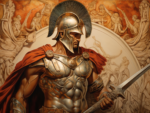
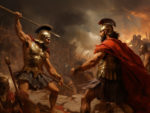
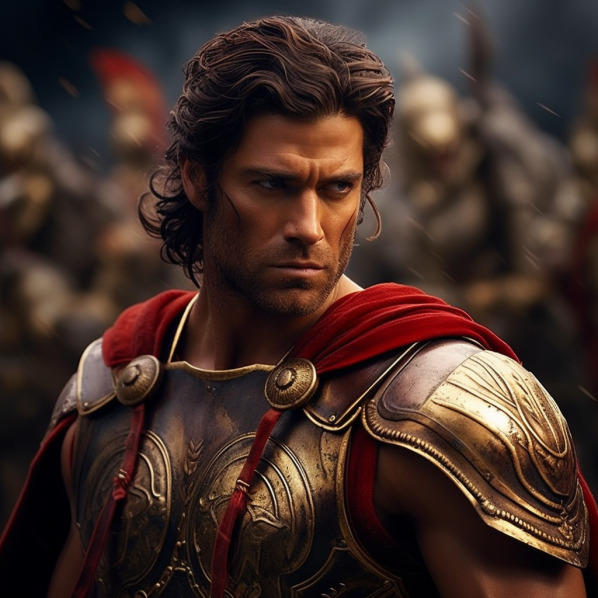
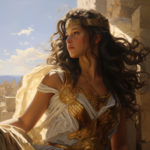
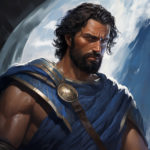
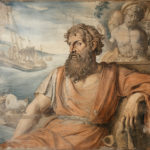
Comments